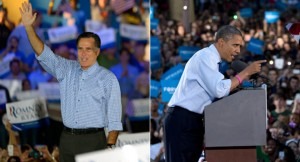Wondering where President Barack Obama and Governor Mitt Romney stand on energy and environmental issues? We’ll attempt to break it down for you.
- Republican candidate Mitt Romney responded to a questionnaire from ScienceDebate.com with the statement “my best assessment of the data is that the world is getting warmer, that human activity contributes to that warming and that policymakers should therefore consider the risk of negative consequences." But a year ago he said "We don’t know what’s causing climate change on this planet. And the idea of spending trillions and trillions of dollars to try to reduce CO2 emissions is not the right course for us." What is clear though, is that Romney opposes taking any costly measures to fight climate change. In his speech to the Republican National Convention, he declared “President Obama promised to slow the rise of the oceans and heal the planet… My promise is to help you and your family.” Obama has been firm on climate change since at least 2008, when he remarked “the science is beyond dispute” and pledged, at the 2008 Democratic National Convention, to build new partnerships to defeat climate change. However, he has not indicated any plans to re-introduce climate change legislation which was defeated in 2010.
- The Huffington Post analysis of Obama and Romney’s most recent energy policy documents reveals that Obama’s “energy security” and Romney’s “energy independence” plans both propose increasing domestic oil production and natural gas extraction via hydraulic “fracking.” They also support use of “clean coal” technology, drawing the ire of many environmentalists who dispute that coal can ever be clean. Where the candidates differ is on “green energy." Romney says Obama’s agenda in that area “has been nothing short of a disaster” and says the five million jobs Obama promised would come out of that sector has resulted in only a few thousand. A concrete example of how this plays out in policy is that Romney pledged to end the 2.2-cent-per kilowatt-hour tax credit for wind power companies. Obama, meanwhile describes his energy policy as an “all of the above” approach including the expansion of renewable resources. He also released new fuel standards that will require U.S. cars to average 54.5 mpg for cars and light-duty trucks by 2025, potentially reducing our daily fuel imports by half. Romney criticized the new standards as government overreach, and has said he would consider repealing the new standards.
- The Romney campaign has set up a 50-person energy issues advisory committee in Colorado, composed of 44 representatives from the mining and drilling industries, plus former Republican officials. In contrast to Obama’s “all of the above” energy policy with a heavy focus on renewable sources, Romney’s plan focuses on oil, gas, and coal. His advisory committee has recommended putting the states in control of oil and gas leases on public lands, and running mate Paul Ryan advocates for streamlining environmental regulations that hamper energy exploration. Meanwhile, under Obama, the Department of the Interior is working on legislation that would require companies engaged in “fracking” on federal lands to disclose the chemicals used in their work. The candidates also strongly disagree on the Keystone XL oil pipeline, which Obama has blocked. Romney says he will get it built “even if I have to do it myself.”
So what do you think? We provide the facts. You decide how to vote.
